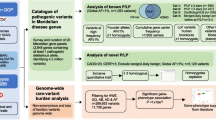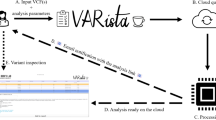Abstract
Pathogenic variants in germline cancer susceptibility genes can increase the risk of a large number of diseases. Our study aims to assess the disease spectrum of gastric cancer susceptibility genes and to develop a comprehensive resource of gene–disease associations for clinicians. Twenty-seven potential germline gastric cancer susceptibility genes were identified from three review articles and from six commonly used genetic information resources. The diseases associated with each gene were evaluated via a semi-structured review of six genetic resources and an additional literature review using a natural language processing (NLP)-based procedure. Out of 27 candidate genes, 13 were identified as gastric cancer susceptibility genes (APC, ATM, BMPR1A, CDH1, CHEK2, EPCAM, MLH1, MSH2, MSH6, MUTYH-Biallelic, PALB2, SMAD4, and STK11). A total of 145 gene–disease associations (with 45 unique diseases) were found to be associated with these 13 genes. Other gastrointestinal cancers were prominent among identified associations, with 11 of 13 gastric cancer susceptibility genes also associated with colorectal cancer, eight genes associated with pancreatic cancer, and seven genes associated with small intestine cancer. Gastric cancer susceptibility genes are frequently associated with other diseases as well as gastric cancer, with potential implications for how carriers of these genes are screened and managed. Unfortunately, commonly used genetic resources provide heterogeneous information with regard to these genes and their associated diseases, highlighting the importance of developing guides for clinicians that integrate data across available resources and the medical literature.

Similar content being viewed by others
Data availability
All data used within this research are available from the corresponding author upon reasonable request.
References
Bray F, Ferlay J, Soerjomataram I, Siegel RL, Torre LA, Jemal A. Global cancer statistics 2018: GLOBOCAN estimates of incidence and mortality worldwide for 36 cancers in 185 countries. CA Cancer J Clin. 2018;68(6):394–424.
International Agency for Research on Cancer. Cancer today. http://gco.iarc.fr/today/online-analysis-pie?v=2018&mode=cancer&mode_population=continents&population=900&populations=900&key=total&sex=0&cancer=39&type=0&statistic=5&prevalence=0&population_group=0&ages_group%5B%5D=0&ages_group%5B%5D=17&nb_items=7&group_cancer=1&include_nmsc=1&include_nmsc_other=1&half_pie=0&donut=0&population_group_globocan_id=.
Siegel RL, Miller KD, Jemal A. Cancer statistics, 2020. CA Cancer J Clin. 2020;70(1):7–30.
Surveillance, epidemiology, and end results program. cancer stat facts: stomach cancer. https://seer.cancer.gov/statfacts/html/stomach.html.
Oliveira C, Pinheiro H, Figueiredo J, Seruca R, Carneiro F. Familial gastric cancer: genetic susceptibility, pathology, and implications for management. Lancet Oncol. 2015;16(2):e60-70.
van der Post RS, Vogelaar IP, Carneiro F, Guilford P, Huntsman D, Hoogerbrugge N, et al. Hereditary diffuse gastric cancer: updated clinical guidelines with an emphasis on germline CDH1 mutation carriers. J Med Genet. 2015;52(6):361–74.
National Comprehensive Cancer Network. Gastric Cancer. https://www.nccn.org/professionals/physician_gls/pdf/gastric.pdf.
Li J, Woods SL, Healey S, Beesley J, Chen X, Lee JS, et al. Point mutations in exon 1B of APC reveal gastric adenocarcinoma and proximal polyposis of the stomach as a familial adenomatous polyposis variant. Am J Hum Genet. 2016;98(5):830–42.
Worthley DL, Phillips KD, Wayte N, Schrader KA, Healey S, Kaurah P, et al. Gastric adenocarcinoma and proximal polyposis of the stomach (GAPPS): a new autosomal dominant syndrome. Gut. 2012;61(5):774–9.
Tedaldi G, Pirini F, Tebaldi M, Zampiga V, Cangini I, Danesi R, et al. Multigene panel testing increases the number of loci associated with gastric cancer predisposition. Cancers (Basel). 2019;11(9):1340.
Chun N, Ford JM. Genetic testing by cancer site: stomach. Cancer J. 2012;18(4):355–63.
Bonadona V, Bonaïti B, Olschwang S, Grandjouan S, Huiart L, Longy M, et al. Cancer risks associated with germline mutations in MLH1, MSH2, and MSH6 genes in Lynch syndrome. JAMA. 2011;305(22):2304–10.
Møller P, Seppälä TT, Bernstein I, Holinski-Feder E, Sala P, Gareth Evans D, et al. Cancer risk and survival in path_MMR carriers by gene and gender up to 75 years of age: a report from the Prospective Lynch Syndrome Database. Gut. 2018;67(7):1306–16.
Engel C, Loeffler M, Steinke V, Rahner N, Holinski-Feder E, Dietmaier W, et al. Risks of less common cancers in proven mutation carriers with lynch syndrome. J Clin Oncol. 2012;30(35):4409–15.
Capelle LG, Van Grieken NCT, Lingsma HF, Steyerberg EW, Klokman WJ, Bruno MJ, et al. Risk and epidemiological time trends of gastric cancer in Lynch syndrome carriers in the Netherlands. Gastroenterology. 2010;138(2):487–92.
Hearle N, Schumacher V, Menko FH, Olschwang S, Boardman LA, Gille JJP, et al. Frequency and spectrum of cancers in the Peutz-Jeghers syndrome. Clin Cancer Res. 2006;12(10):3209–15.
Giardiello FM, Brensinger JD, Tersmette AC, Goodman SN, Petersen GM, Booker SV, et al. Very high risk of cancer in familial Peutz-Jeghers syndrome. Gastroenterology. 2000;119(6):1447–53.
Hansford S, Kaurah P, Li-Chang H, Woo M, Senz J, Pinheiro H, et al. Hereditary diffuse gastric cancer syndrome: CDH1 mutations and beyond. JAMA Oncol. 2015;1(1):23–32.
ClinGen. Gene Validity Curations. [Available from: https://search.clinicalgenome.org/kb/gene-validity]
NCCN Clinical practice guidelines in oncology. https://www.nccn.org/professionals/physician_gls/default.aspx.
Rehm HL, Berg JS, Brooks LD, Bustamante CD, Evans JP, Landrum MJ, et al. ClinGen–the clinical genome resource. N Engl J Med. 2015;372(23):2235–42.
Genetics home reference. https://ghr.nlm.nih.gov/.
Home - OMIM - NCBI. https://www.ncbi.nlm.nih.gov/omim.
GeneCards human gene database. https://www.genecards.org.
Adam MP, Ardinger HH, Pagon RA, Wallace SE, Bean LJH, Stephens K, et al., eds. Gene-NCBI®. Seattle (WA): University of Washington, Seattle, 2010
Wang J, Singh P, Yin K, Zhou J, Bao Y, Wu M, et al. Disease spectrum of breast cancer susceptibility genes. medRxiv. 2020. https://doi.org/10.1101/2020.08.11.2017200.
Sahasrabudhe R, Lott P, Bohorquez M, Toal T, Estrada AP, Suarez JJ, et al. Germline mutations in PALB2, BRCA1, and RAD51C, which regulate DNA recombination repair, in patients with gastric cancer. Gastroenterology. 2017;152(5):983-6.e6.
Petrovchich I, Ford JM. Genetic predisposition to gastric cancer. Semin Oncol. 2016;43(5):554–9.
Slavin TP, Weitzel JN, Neuhausen SL, Schrader KA, Oliveira C, Karam R. Genetics of gastric cancer: what do we know about the genetic risks? Transl Gastroenterol Hepatol. 2019;4:55.
Bao Y, Deng Z, Wang Y, Kim H, Armengol VD, Acevedo F, et al. Using machine learning and natural language processing to review and classify the medical literature on cancer susceptibility genes. JCO Clin Cancer Inform. 2019;3:1–9.
Deng Z, Yin K, Bao Y, Armengol VD, Wang C, Tiwari A, et al. Validation of a semi-automated natural language processing-based procedure for meta-analysis of cancer susceptibility gene penetrance. JCO Clin Cancer Inform. 2019;3:1–9.
American cancer society. stomach cancer survival rates. https://www.cancer.org/cancer/stomach-cancer/detection-diagnosis-staging/survival-rates.html#references.
MedlinePlus – Genetics. https://medlineplus.gov/genetics/.
Plichta JK, Griffin M, Thakuria J, Hughes KS. What’s new in genetic testing for cancer susceptibility? Oncology (Williston Park). 2016;30(9):787–99.
Hughes KS, Zhou J, Bao Y, Singh P, Wang J, Yin K. Natural language processing to facilitate breast cancer research and management. Breast J. 2020;26(1):92–9.
Braun D, Yang J, Griffin M, Parmigiani G, Hughes KS. A clinical decision support tool to predict cancer risk for commonly tested cancer-related germline mutations. J Genet Couns. 2018;27(5):1187–99.
Manahan ER, Kuerer HM, Sebastian M, Hughes KS, Boughey JC, Euhus DM, et al. Consensus guidelines on genetic testing for hereditary breast cancer from the American Society of Breast Surgeons. Ann Surg Oncol. 2019;26(10):3025–31.
Teodorczyk U, Cybulski C, Wokołorczyk D, Jakubowska A, Starzyńska T, Lawniczak M, et al. The risk of gastric cancer in carriers of CHEK2 mutations. Fam Cancer. 2013;12(3):473–8.
Näslund-Koch C, Nordestgaard BG, Bojesen SE. Increased risk for other cancers in addition to breast cancer for CHEK2*1100delC heterozygotes estimated from the copenhagen general population study. J Clin Oncol. 2016;34(11):1208–16.
Kaczmarek-Ryś M, Ziemnicka K, Hryhorowicz ST, Górczak K, Hoppe-Gołębiewska J, Skrzypczak-Zielińska M, et al. The c.470 T > C CHEK2 missense variant increases the risk of differentiated thyroid carcinoma in the Great Poland population. Hered Cancer Clin Pract. 2015;13(1):8.
Siołek M, Cybulski C, Gąsior-Perczak D, Kowalik A, Kozak-Klonowska B, Kowalska A, et al. CHEK2 mutations and the risk of papillary thyroid cancer. Int J Cancer. 2015;137(3):548–52.
Acknowledgements
The authors acknowledge Ann S. Adams (Department of Surgery, Massachusetts General Hospital) for editorial and writing assistance.
Funding
This study received no specific funding.
Author information
Authors and Affiliations
Corresponding author
Ethics declarations
Conflict of interest
Kevin S. Hughes receives Honoraria from Hologic (Surgical implant for radiation planning with breast conservation and wire-free breast biopsy) and Myriad Genetics and has a financial interest in CRA Health (Formerly Hughes RiskApps). CRA Health develops risk assessment models/software with a particular focus on breast cancer and colorectal cancer. Dr. Hughes is a founder and owns equity in the company. Dr. Hughes is the Co-Creator of Ask2Me.Org which is freely available for clinical use and is licensed for commercial use by the Dana Farber Cancer Institute and the MGH. Dr. Hughes's interests in CRA Health and Ask2Me.Org were reviewed and are managed by Massachusetts General Hospital and Partners Health Care in accordance with their conflict-of-interest policies. Dr. Braun co-leads the BayesMendel laboratory, which licenses software for the computation of risk prediction models. She does not derive any personal income from these licenses. All revenues are assigned to the lab for software maintenance and upgrades. The other authors declare that they have no conflict of interest.
Ethical approval
We used public databases with no patient data, and ethical committee was waived.
Additional information
Publisher's Note
Springer Nature remains neutral with regard to jurisdictional claims in published maps and institutional affiliations.
Supplementary Information
Below is the link to the electronic supplementary material.
Rights and permissions
About this article
Cite this article
McKinley, S.K., Singh, P., Yin, K. et al. Disease spectrum of gastric cancer susceptibility genes. Med Oncol 38, 46 (2021). https://doi.org/10.1007/s12032-021-01495-w
Received:
Accepted:
Published:
DOI: https://doi.org/10.1007/s12032-021-01495-w




